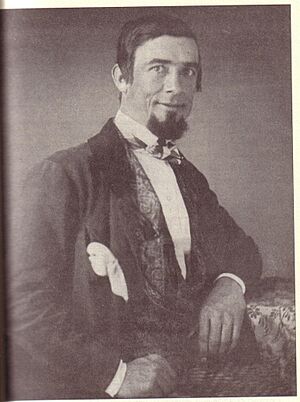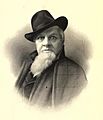Dan Rice facts for kids

Dan Rice (born January 23, 1823 – died February 22, 1900) was a famous American entertainer. He was best known as a clown before the American Civil War. At the peak of his career, almost everyone knew his name! Dan Rice also created the phrases "One Horse Show" and "Greatest Show." He helped make popular entertainment what it is today. This was especially true with new technologies from the Industrial Revolution. Rice even ran for President of the United States in 1868. After the Civil War, circuses and popular culture changed. Because of this, his fame slowly faded. In 2001, a writer named David Carlyon called him "the most famous man you've never heard of."
Contents
Dan Rice's Amazing Life
Born Daniel McLaren in New York City, Dan Rice became many things. He was a circus clown, animal trainer, songwriter, commentator, circus strongman, actor, director, producer, dancer, and even a politician! He tried to run for Senate, House, and President of the United States. However, he dropped out of each race.
Rice's uncle was a ringmaster for the Howes & Turner circus. This circus started in Salem, New York, in 1826. Rice himself said this was the first American circus to use the canvas tent. This tent later became a famous part of circuses. He traveled with this circus for several years when he was young.
Rice was very creative in how he put together his shows. He combined animals, acrobats, and clowns in new ways. He started performing in 1841. His first big act involved a pig named Sybil. Sybil's tricks included pretending to tell time! He then moved on to singing and dancing. He even briefly performed in blackface, which was a common but now seen as offensive act at the time.
As he became more famous, he changed his style again. He starred in funny versions of plays by William Shakespeare. These included "Dan Rice's Version of Othello" and "Dan Rice's Multifarious Account of Shakespeare's Hamlet." He would perform these with different songs and accents. People said Rice was not just funnier than other clowns. He was different because he mixed jokes, serious thoughts, ideas about the community, and songs. During the 1847–48 season, he worked with the circus of Gilbert R. Spalding.
Becoming a Show Producer
Dan Rice began to create his own shows. Often, he had more than one show touring at the same time. He then changed his image to that of a gentleman. He got involved in politics. His shows often had ideas that supported the Democratic Party. Many newspapers and writers liked him. This included a young Mark Twain and Walt Whitman. Mark Twain even wrote about a circus in his book Adventures of Huckleberry Finn. It's likely that Twain, as a boy, saw Rice perform when his circus came to Hannibal.
His shows became more famous than any other shows touring at the time. This included shows by his rival, P. T. Barnum. Rice was a pioneer of a style of entertainment called vaudeville even before it was officially named. He was very patriotic. Later, he influenced famous people like George M. Cohan. He was also one of the main inspirations for the character "Uncle Sam". Dan Rice died almost without money in 1900. He is buried in the Old First Methodist Church cemetery in West Long Branch, New Jersey.
The small town of Girard, Pennsylvania, was home to Dan Rice for many years. This town now has a three-day festival dedicated to him called "Dan Rice Days."
Famous Sayings He Inspired
Many popular expressions came from Dan Rice's life and shows.
- "Jump on the bandwagon": Rice supported Zachary Taylor for president. He invited Taylor to campaign on his circus wagon, which was where the band played. This is where the expression "to jump on the bandwagon" comes from. It means joining something popular or successful.
- "One horse show": Early in his career, Rice was not doing well. He only had one horse for his show. Other circuses made fun of him, calling it a "one horse show" to insult him. But Rice put on such a good show that he turned the insult around. The phrase became famously linked to him for the rest of his life. It now means a show or event where one person does most of the work.
- "Hey, Rube!": This rallying cry started in New Orleans in 1848. A member of Rice's circus group was attacked by a crowd. He yelled to his friend Reuben, "Hey, Rube!" In the circus world today, "Hey, Rube" means "come help in this fight."
- "The Greatest Show on Earth": Decades before other circuses used this phrase, a newspaper in Arkansas praised Rice's show. They called it "The Greatest Show on Earth." This phrase later became very famous for circuses.
Images for kids
See also
 | Laphonza Butler |
 | Daisy Bates |
 | Elizabeth Piper Ensley |



